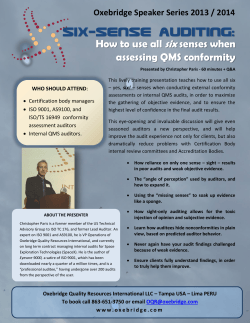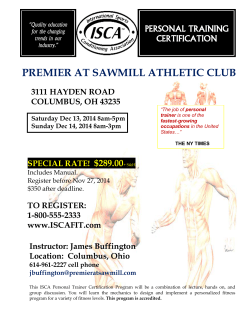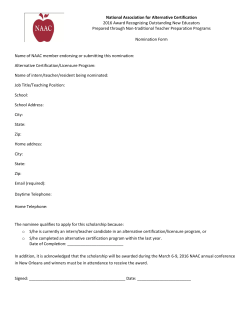
Position Information: Title: Executive Director of the
Position Information: Title: Executive Director of the PROFESSIONAL ANIMAL AUDITOR CERTIFICATION ORGANIZATION (PAACO) Responsibilities: The Executive Director is responsible for the successful leadership and management of PAACO in accordance with directives and duties set by the Board of Directors. Qualifications: The Executive Director must have management experience, strong foundational knowledge of food animal welfare and the ability to communicate effectively with diverse stakeholders. Experience with crisis management and media training preferred. Ability to use technology, web based resources, Microsoft Office and other digital resources. PAACO purpose and function: In 2004, professional animal industry organizations formed PAACO to promote the humane treatment of animals through education and certification of animal auditors, as well as the review and/or certification of animal audit instruments, assessments and programs. Currently the are five Founding Organizations: American Registry of Professional Animal Scientists (ARPAS), American Association of Avian Pathologists (AAAP), American Association of Bovine Practitioners (AABP), American Association of Swine Veterinarians (AASV), and Federation of Animal Science Societies (FASS). PAACO is governed by a 15-member board made up of 3 appointees from each of the founding member organizations. Board officers include a chairman, vice-chairman, secretary, and treasurer. In addition, three standing committees (Training and Education, Qualifications and Standards, and Finance) work in conjunction with the Board and Executive Director in performing specific tasks. The board meets semi-annually. For additional information see http://animalauditor.org/. Primary Duties and Responsibilities: The Executive Director coordinates the following activities: Audit Instrument certification PAACO maintains standards for audit instrument certification. The standards are the guiding document for audit certification and are reviewed by the board as needed to remain current with the advancement of animal welfare science. Currently there are seven PAACO certified audits: American Meat Institute Meat Plant Welfare, Validus Dairy Production, FACTA Swine Production, Common Swine Industry Audit, Perdue Foods Broiler Production, FACTA Broiler Production and FACTA Turkey Production. To maintain certification status, all audit instruments undergo annual reviews for re-certification. Auditor Training Auditor training is one of PAACO’s fundamental contributions to the animal welfare community. Trainings are currently conducted in person in 2 to 3 days sessions. These trainings are held at locations that allow experiential learning and objective evaluation. Depending on the species focus and geographic market, each training session has 20 to 85 attendees. The number of trainings offered is driven by interest and demand of the supply chain audit end-users. Demand is expected to undergo rapid growth over the next 12-24 months. In 2014, five Meat Plant trainings were held, including one in Canada. Currently the Poultry auditor training is held once per year. Requests for new production specific auditor trainings are expected. One such training is currently under development under the guidance of the PAACO Board. Development and implementation of a contracted auditor training for cattle, swine and broiler slaughter in Brazil began in 2014. Certify Auditors Auditors must maintain their certification status through 12 annual contact hours of continuing education. The executive director is charged with communicating with certified auditors concerning their current status for recertification as well as reviewing and approving recertification. In addition, requirements and opportunities for continuing education and training are to be communicated. Currently there are four categories of certified PAACO auditors or verifiers: Meat Plant, Poultry (layer, broiler & turkey), Dairy, and PQA+. Other Duties of the Executive Director Participate with the Board of Directors in developing and implementing PAACO’s vision and strategic plan. Develop an operational plan which incorporates goals and objectives that work towards the strategic direction of the organization. Ensure that the operation of the organization meets the expectations of its stakeholders, Board and Founding Organizations. Oversee the day-to-day operation of the organization, including coordinating meetings, trainings and maintaining continuing education opportunities for auditors. Identify, assess, and inform the Board of Directors of internal and external issues that may affect the organization. Act as a professional advisor to the Board of Director on all aspects of the organization's activities including contracting with professional subject matter experts as needs arise. Foster effective team work between the Board and the Executive Director. Determine staffing requirements for organizational management and program delivery; as approved by the Board. Work with the Board (Finance Committee) to prepare a comprehensive budget. Work with the Board to secure adequate funding for the operation of the organization. Research and pursue funding sources, oversee the development of fund raising plans and write funding proposals as needed. Communicate with stakeholders to keep them informed of the work of the organization and to identify changes in the community served by the organization (Monthly e-letter, direct communication with Founding Organizations, communication with shareholders, etc.). Identify and evaluate the risks to the organization's people (clients, staff, management and volunteers), property, finances, goodwill, and image; implement measures to control risks. Inform Board of animal welfare issues that may impact the organization. Work with Board and/or appropriate committee regarding interaction with the media regarding such issues. Minimum Required Qualifications Applicant must have a degree in Animal Agriculture (BS required, MS, PhD, or DVM preferred) and at least 5 years of experience in animal welfare program development, evaluation or management. Experience preferred in conducting animal audits or developing audit tools and documents. Review Process and Contacts Please provide via email, by April 20, 2015, a cover letter, resume, college transcripts, and list of three professional references. Send to Dr. Terry Mader at tmader1@unl.edu. For more information contact Dr. Mader or Dr. Karen Christensen kc014@uark.edu
© Copyright 2025





















